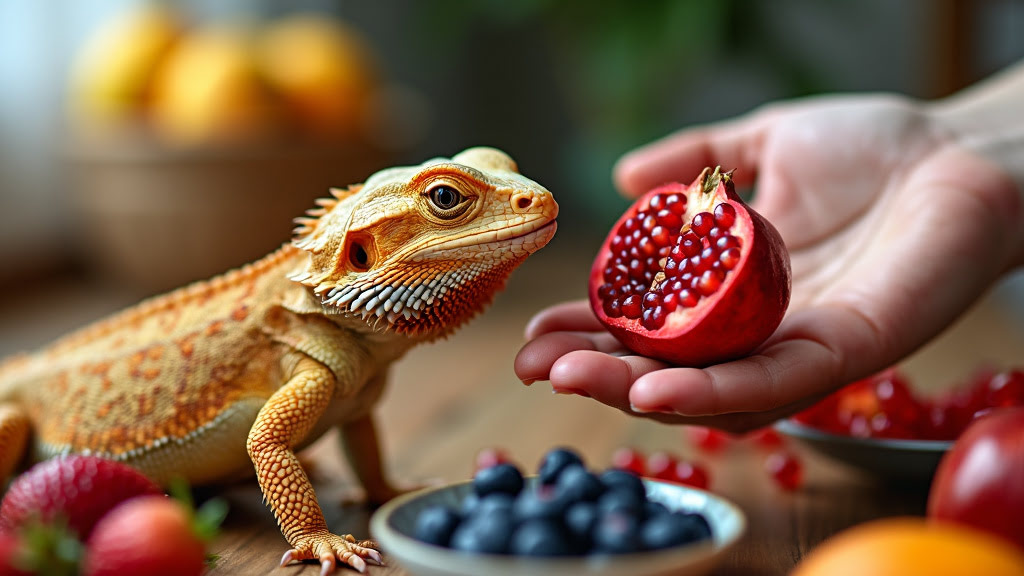Imagine this: Your bearded dragon is staring at a bright red pomegranate seed in your hand. Can bearded dragons eat pomegranate? Let’s explore the colourful, tasty world of pomegranates and find out if these juicy seeds make a good snack for your scaly friend.
What Bearded Dragons Eat
To keep your bearded dragon happy and healthy, you need to make sure they eat a balanced diet. Bearded dragons are omnivores, which means they eat both plants and animals. They need a mix of proteins, vegetables, and a little bit of fruit, much like a varied buffet to keep them in top shape!
What Dragons Need in Their Diet
A good diet for a bearded dragon has to be balanced. They need proteins from insects like crickets and mealworms. Vegetables are also essential because they provide vitamins and minerals. Fruits are acceptable too, but only in small amounts because they have a lot of sugar. Too much of any one thing can cause problems.
My Experience
When I first got my bearded dragon, Jumpy, figuring out what to feed him was like an adventure. I found out that he loved crunchy crickets but didn’t like leafy kale. He had clear favourites and definite “no-no” foods, just like a picky eater.
What’s in a Pomegranate?
Can bearded dragons eat pomegranate? Let’s look at what’s inside these bright red seeds.
Good Stuff in Pomegranates
- Vitamins: Pomegranates have lots of Vitamin C and Vitamin K, which help with immune function and bone health.
- Antioxidants: These help fight harmful substances in the body.
- Sugars and Fibres: Pomegranates have natural sugars and fibres that can aid digestion, but only if eaten in small amounts.
Good and Bad Points
Feeding your bearded dragon pomegranate can give them a boost of nutrients and hydration. However, pomegranates also have a lot of sugar, which can cause stomach problems if they eat too much. So, it’s important to only give them a small amount occasionally.
Is Pomegranate Safe for Bearded Dragons?
Yes, bearded dragons can eat pomegranate, but only in very small amounts and not often. Giving them a tiny bit as a treat can be enjoyable for them if you do it right. But pomegranates should not be a significant part of their diet.
Watch out for any adverse reactions like tiredness, diarrhoea, or loss of appetite. If you see any of these signs, take your dragon to the vet immediately.
My Tips
Offering new fruits to Jumpy has always been interesting. The first time I gave him a tiny pomegranate seed, he was curious and then liked it a lot. But I always make sure to give it to him in small amounts.
How to Give Pomegranate Safely
If you want to give your bearded dragon pomegranate, here’s how to do it safely:
Steps to Follow
- Wash it thoroughly: Wash the pomegranate to remove any pesticides or dirt.
- Remove the seeds: Carefully take out the seeds, as those are the parts your dragon can eat.
- Give in tiny amounts: Offer just a few seeds at a time and mash them a bit to make them easier to eat.
My Advice
From my experience, I watch Jumpy closely after giving him new food. It’s a good idea to keep an eye on your dragon for at least a day to ensure they don’t have any adverse reactions. Remember, fruits should be a special treat, not a daily offering.
Other Fruit Options
If pomegranate doesn’t seem right for your bearded dragon, that’s okay! There are other fruits they can enjoy safely.
More Safe Fruits
- Blueberries: These have less sugar and are full of antioxidants.
- Strawberries: Popular but should be given in small amounts due to sugar content.
- Mango: Sweet and nutrient-rich, another excellent option.
Favourites
Jumpy loves blueberries and mango. It’s fun to watch him enjoy these juicy treats, but again, they are given as special treats.
When to Talk to a Vet
If you notice anything unusual after giving your bearded dragon new food, consult a vet. If your dragon’s appetite changes, or if they have different stool or seem less energetic, these are signs to seek help.
Regular Vet Visits
Regular check-ups with the vet are essential to ensure your bearded dragon stays healthy and eats the right diet. Home care is important, but professional advice is best for your dragon’s well-being.
To Sum It Up
Can bearded dragons eat pomegranate? Yes, but only as a special treat. Keeping their diet balanced is the key to ensuring they stay healthy and happy. Always watch them closely when introducing new foods and consult a vet if you have doubts.
At Dug’s Bugs, we love sharing healthy food ideas for our pets. Seeing Jumpy enjoy a new treat brings me a lot of joy as a pet owner.
Join the Conversation
We’d love to hear from you! Share your thoughts or questions in the comments below. Don’t forget to subscribe for more tips and updates on caring for exotic pets. Happy feeding!
Learn More
To learn more about caring for bearded dragons, check out our other articles. If you need vet advice, we recommend talking to experts who specialise in exotic pets.

